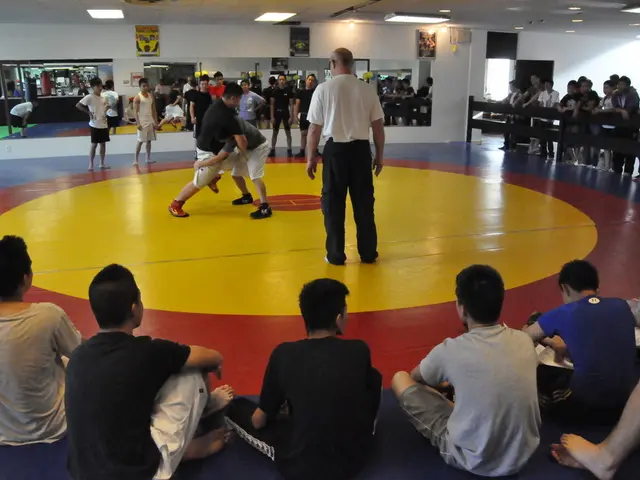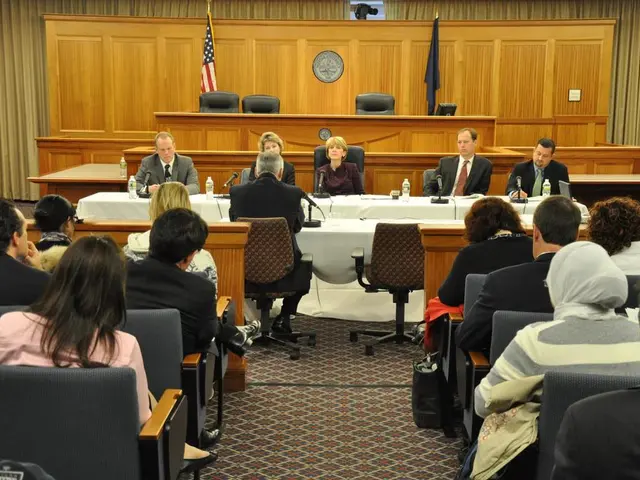Striking a Balance: Chicago Teachers Union Demands for Eco-Friendly Classrooms
In the heart of Chicago, a significant debate is unfolding as the Chicago Teachers Union (CTU) pushes for extensive climate-related demands during contract negotiations. The union, led by President Stacy Davis Gates, is advocating for a greener future for the city's schools, with initiatives such as electric school buses, green job training programs, and emission reduction strategies.
The political dynamic between the CTU and Mayor Brandon Johnson, a former union organizer, presents a complex landscape. Johnson's support during the campaign potentially signals a favorable response to the CTU's demands. However, the union's insistence on climate policies has sparked debate about fiscal priorities in a school system with ongoing performance challenges.
Chicago Public Schools are grappling with a substantial budget shortfall of $734 million, amid declining enrollment and chronically low academic achievement. Approximately 75% of Chicago's public school students are unable to read at grade level, and 83% lag behind in math proficiency. Critics argue that prioritizing costly environmental initiatives diverts attention and resources from more urgent concerns like improving classroom learning outcomes and basic student safety.
The CTU's climate agenda, if implemented, could lead to significant environmental benefits. For instance, the formation of a Green Schools and Climate Preparedness Committee, the installation of solar panels, and the construction of new "green" school facilities are all part of a Healthy Green Schools Pilot Program. This program aims to implement clean energy projects like rooftop solar, geothermal systems, and heat pumps, particularly in "Environmental Justice" communities.
However, the immediate concern remains the academic proficiency of Chicago's youth. The financial strain and resource allocation towards climate goals could potentially exacerbate these challenges unless balanced effectively. The CTU's initiatives, if successful, could also offer educational opportunities in green sectors for students, underscoring the need for a multidisciplinary approach.
The CTU's collective bargaining agreement and coalition work, especially in communities of colour, could benefit everyone. Strategically investing in education while incorporating sustainable practices can be a path forward. The union's actions demonstrate accountability to the larger community, as they aim to address various environmental issues within the school infrastructure.
Broader research on climate change and education indicates that climate-related disruptions can negatively affect school operations and learning outcomes nationwide. However, specific evidence linking Chicago’s green school initiatives to improved academic performance remains limited. Despite this, the importance of resilient infrastructure to safeguard student success cannot be overstated.
In conclusion, while the CTU's climate-related demands aim to modernize and "green" Chicago's school infrastructure, the current context of budget deficits and low academic performance creates significant cost implications and controversy about whether these policies align with immediate educational priorities. A balance is needed where academic and environmental goals can coexist without compromise. The CTU's initiatives, if implemented effectively, could offer a sustainable future for Chicago's schools and students, while ensuring academic success remains the top priority.
[1] Chicago Sun-Times, "CTU secures significant climate-related provisions in $1.5 billion contract," April 2025. [2] Education Week, "Study: Climate Change Could Hurt Student Test Scores," March 2023. [3] E&E News, "CTU's climate-related demands could cost hundreds of millions of dollars," March 2023. [4] The Guardian, "Chicago teachers' union secures climate commitments in contract," April 2025.
- The Chicago Teachers Union's (CTU) push for climate-related initiatives during contract negotiations has led to a significant debate in the realm of education and self-development, as well as politics, given the union's environmental science-focused demands.
- The implementation of the CTU's climate agenda, such as the formation of a Green Schools and Climate Preparedness Committee, could lead to environmental benefits, but it also raises questions about the allocation of resources in the face of budget shortfalls and academic performance challenges in Chicago's schools.
- As the CTU and Mayor Brandon Johnson navigate the complex landscape of their political dynamic, the union's insistence on climate policies has sparked debate about fiscal priorities, particularly in relation to General News stories about Chicago Public Schools' ongoing performance challenges in areas like reading and math proficiency.








